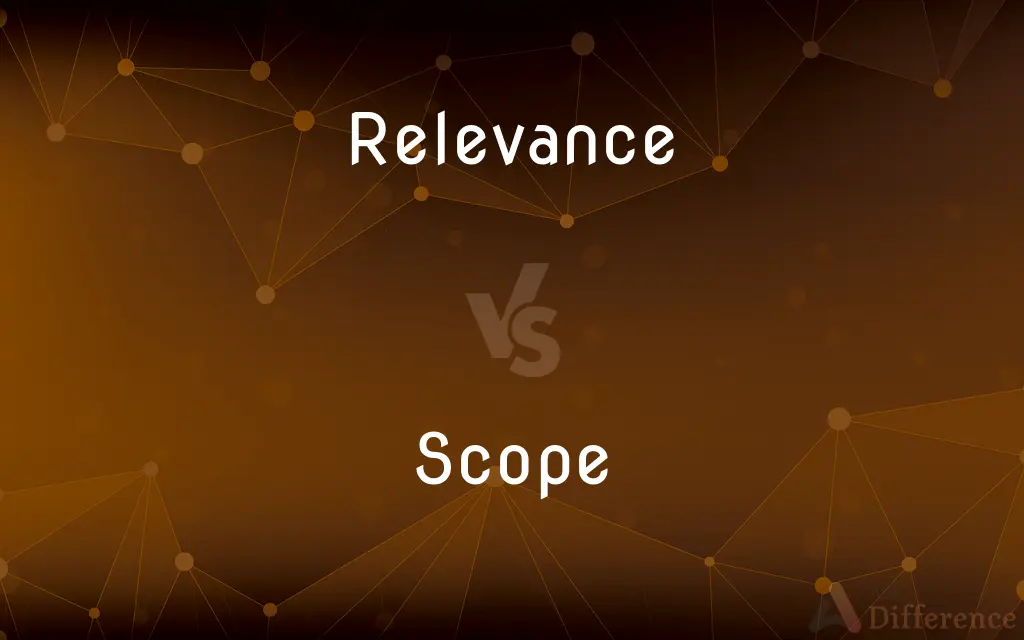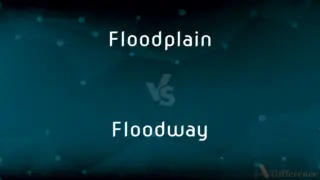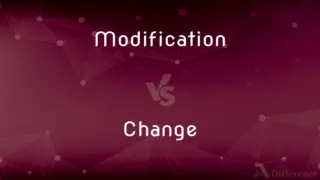Relevance vs. Scope — What's the Difference?
By Fiza Rafique & Urooj Arif — Updated on March 13, 2024
Relevance determines how closely content aligns with current needs or interests, while scope defines the breadth or extent of content covered.

Difference Between Relevance and Scope
Table of Contents
ADVERTISEMENT
Key Differences
Relevance is about the significance or applicability of information to a particular context or problem. It assesses how well content meets the specific needs or interests of an audience at a given time. On the other hand, scope refers to the breadth or range of topics, areas, or content that a project, research, document, or discussion encompasses. It outlines the boundaries within which a subject is explored or addressed.
While relevance focuses on the immediate usefulness and pertinence of information to a specific situation, scope delves into how wide or narrow the field of inquiry or discussion is set to be. For instance, a relevant topic might be narrowly scoped to address a specific question thoroughly, whereas another topic might have a broad scope but low relevance to the immediate needs of its audience.
The determination of relevance often requires understanding the audience's current interests, needs, or problems, ensuring that the content or information provided is directly applicable or helpful. Scope, in contrast, is predetermined based on the objectives of a study, project, or discussion, delineating the limits of what will be explored or discussed.
Relevance is dynamic and can change over time as the needs and interests of the audience evolve. A topic or information considered highly relevant today might lose its importance as new trends or issues emerge. Conversely, the scope of a project or research is usually set at the beginning and remains consistent throughout its duration, providing a clear guideline of what is included and what is outside its boundaries.
Relevance and scope, while distinct, are interrelated in the planning and execution of projects, research, and content creation. A well-defined scope ensures that the exploration of a topic is thorough and comprehensive, while maintaining relevance ensures that the information remains valuable and engaging to its intended audience.
ADVERTISEMENT
Comparison Chart
Definition
Significance or applicability of information to a context.
Breadth or range of topics, areas, or content covered.
Focus
Immediate usefulness and pertinence.
Range of inquiry or discussion.
Determination
Based on audience's current needs or interests.
Predetermined based on project or research objectives.
Dynamic
Changes over time with audience's evolving needs.
Usually set at the beginning and remains consistent.
Interrelation
Ensures information is valuable and engaging.
Defines limits of exploration or discussion.
Compare with Definitions
Relevance
Pertinence to the matter at hand.
The relevance of his speech to the current crisis was unmistakable.
Scope
The extent of the area or subject matter that something deals with.
The scope of the investigation was broadened.
Relevance
The quality of being closely connected or appropriate.
The relevance of education in fostering innovation is well documented.
Scope
The reach or range of influence.
This issue is beyond the scope of this article.
Relevance
Suitability for a specific context or purpose.
They questioned the relevance of the data to the scientific study.
Scope
The range of exposure, topics, or activities.
The documentary's scope includes cultures worldwide.
Relevance
Importance or significance at a particular time.
The article gained relevance in light of recent events.
Scope
The opportunity or possibility to do or deal with something.
The new law provides scope for further reforms.
Relevance
The degree to which something is related or useful to what is happening or being talked about.
Her experience has a lot of relevance for this job.
Scope
The ambit or range of a subject or object.
Her study falls within the scope of social sciences.
Relevance
Relevance is the concept of one topic being connected to another topic in a way that makes it useful to consider the second topic when considering the first. The concept of relevance is studied in many different fields, including cognitive sciences, logic, and library and information science.
Scope
The opportunity or possibility to function or be active
Gave her imagination broad scope.
Relevance
The quality or state of being closely connected or appropriate
The quantity, quality, and relevance of links count towards your rating
This film has contemporary relevance
The Web does allow us to produce more articles of relevance to our readers
Scope
The range of one's perceptions, thoughts, or actions
Broaden one's scope by reading.
Relevance
Having a bearing on or connection with the matter at hand.
Scope
The extent of a given activity or subject that is involved, treated, or relevant
The scope of the debate.
Relevance
Meaningful or purposeful in current society or culture
Thought that the traditional male role of breadwinner was no longer relevant.
Scope
The length or sweep of a mooring cable.
Relevance
The property or state of being relevant or pertinent.
Scope
(Linguistics) The range over a part of a sentence or discourse that a quantifier has an effect on.
Relevance
The quality or state of being relevant; pertinency; applicability.
Its answer little meaning, little relevancy bore.
Scope
A viewing instrument such as a periscope, microscope, or telescope.
Relevance
Sufficiency to infer the conclusion.
Scope
To examine or investigate, especially visually
Scoped the landscape for signs of wildlife.
Relevance
The relation of something to the matter at hand
Scope
To examine using an optical instrument such as a telescope or an endoscope
Scoped the stars around Orion.
Scoped the patient's esophagus.
Scope
The breadth, depth or reach of a subject; a domain.
Scope
(weapons) A device used in aiming a projectile, through which the person aiming looks at the intended target.
Scope
Opportunity; broad range; degree of freedom.
Scope
(programming) The region of program source code in which a given identifier is meaningful, or a given object can be accessed.
Scope
(logic) The shortest sub-wff of which a given instance of a logical connective is a part.
Scope
(linguistics) The region of an utterance to which some modifying element applies.
The scope of an adverb
Scope
(slang) A periscope, telescope, microscope or oscilloscope.
Scope
Any medical procedure that ends in the suffix -scopy, such as endoscopy, colonoscopy, bronchoscopy, etc.
Scope
(obsolete) A bundle, as of twigs.
Scope
To perform a cursory investigation of; scope out.
Scope
To perform any medical procedure that ends in the suffix -scopy, such as endoscopy, colonoscopy, bronchoscopy, etc.
The surgeon will scope the football player's knee to repair damage to a ligament.
Scope
To define the scope of something.
Scope
(programming) To limit (an object or variable) to a certain region of program source code.
If we locally scope the user's login name, it won't be accessible from outside this function.
Scope
(informal) To examine under a microscope.
The entomologist explained that he could not tell what species of springtail we were looking at without scoping it.
Scope
To observe a bird using a spotting scope.
Scope
That at which one aims; the thing or end to which the mind directs its view; that which is purposed to be reached or accomplished; hence, ultimate design, aim, or purpose; intention; drift; object.
Your scope is as mine own,So to enforce or qualify the lawsAs to your soul seems good.
The scope of all their pleading against man's authority, is to overthrow such laws and constitutions in the church.
Scope
Room or opportunity for free outlook or aim; space for action; amplitude of opportunity; free course or vent; liberty; range of view, intent, or action.
Give him line and scope.
In the fate and fortunes of the human race, scope is given to the operation of laws which man must always fail to discern the reasons of.
Excuse me if I have given too much scope to the reflections which have arisen in my mind.
An intellectual cultivation of no moderate depth or scope.
Scope
Extended area.
Scope
Length; extent; sweep; as, scope of cable.
Scope
To look at for the purpose of evaluation; usually with out; as, to scope out the area as a camping site.
Scope
An area in which something acts or operates or has power or control:
The range of a supersonic jet
The ambit of municipal legislation
Within the compass of this article
Within the scope of an investigation
Outside the reach of the law
In the political orbit of a world power
Scope
The state of the environment in which a situation exists;
You can't do that in a university setting
Scope
A magnifier of images of distant objects
Scope
Electronic equipment that provides visual images of varying electrical quantities
Common Curiosities
What is relevance?
Relevance refers to how pertinent, connected, or applicable information is to a particular issue, situation, or context.
What defines the scope of a project?
The scope of a project is defined by its objectives, outlining the range or breadth of topics, issues, or content that it will cover or address.
Why is determining relevance important?
Determining relevance is crucial for ensuring that information, research, or content is meaningful and useful to its intended audience, enhancing its impact and effectiveness.
Can the scope of a study be changed?
While the scope is usually set at the beginning, it can be adjusted in response to unforeseen challenges or discoveries, although such changes may have implications for the project's timelines and outcomes.
What factors influence the relevance of information?
Factors include the audience's current interests, needs, societal trends, and the specific context in which the information is being used or discussed.
Can a broad scope dilute the relevance of content?
Yes, a very broad scope can make it harder to maintain the relevance of all included content to a specific audience or objective.
How does relevance affect content engagement?
High relevance increases content engagement by ensuring the information meets the audience's current needs, interests, or problems, making it more valuable and compelling.
How do you ensure a project's scope is appropriate?
By clearly defining objectives, understanding the audience or users, and considering resources and limitations, you can ensure the project's scope is both ambitious and achievable.
Why is it important to balance relevance and scope?
Balancing relevance and scope ensures that content or research is both comprehensive and focused on areas of greatest interest or need.
How is scope related to depth of information?
Scope influences the depth of information; a broader scope may cover more topics with less depth, while a narrower scope allows for more detailed exploration of fewer topics.
Does relevance vary from audience to audience?
Yes, what is relevant to one audience may not be to another, as relevance is highly dependent on specific interests, needs, and contexts.
How do you determine the relevance of a topic?
By assessing its connection to current events, its impact on the intended audience, and its potential to address specific questions or needs.
What is the difference between scope and topic?
Topic refers to the subject being discussed or studied, while scope defines the extent to which the topic will be explored or discussed.
How does scope impact research outcomes?
The scope determines the range of questions explored, influencing the depth of analysis and potentially the applicability of research findings.
What is an example of a relevance shift over time?
Topics related to technology can quickly shift in relevance as new innovations emerge and old technologies become obsolete.
Share Your Discovery

Previous Comparison
Floodplain vs. Floodway
Next Comparison
Modification vs. ChangeAuthor Spotlight
Written by
Fiza RafiqueFiza Rafique is a skilled content writer at AskDifference.com, where she meticulously refines and enhances written pieces. Drawing from her vast editorial expertise, Fiza ensures clarity, accuracy, and precision in every article. Passionate about language, she continually seeks to elevate the quality of content for readers worldwide.
Co-written by
Urooj ArifUrooj is a skilled content writer at Ask Difference, known for her exceptional ability to simplify complex topics into engaging and informative content. With a passion for research and a flair for clear, concise writing, she consistently delivers articles that resonate with our diverse audience.














































